A sunrise visit to Shwedagon Pagoda in Yangon, Myanmar! Burma golden temple, Buddhist travel destinations.
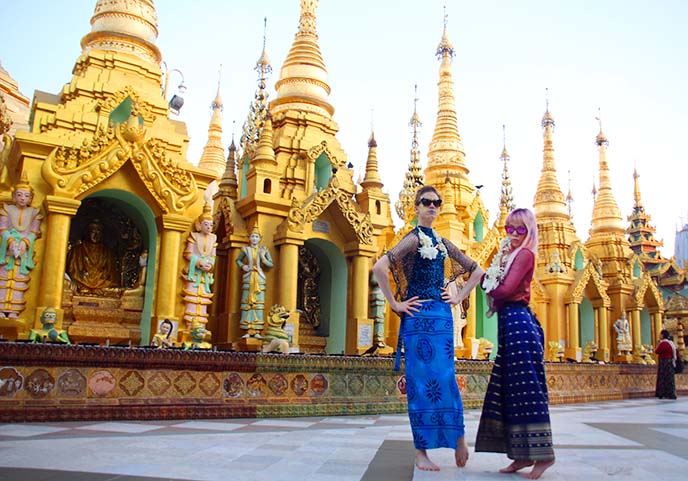
I’ve been to temples all over Southeast Asia, but none has been as extraordinary as Shwedagon Pagoda in Myanmar. In this photo diary, Yukiro and I will show you why!
Before we begin our pilgrimage, I’m humbled and thrilled to announce that I won the Best Blog of the Year award! A zillion thank yous to everyone who voted in the Auxiliary Magazine awards. None of this would have been possible without your support throughout the years. Congrats to the other winners and fabulous nominees, and I am excited to keep on bringing alternative travel stories to you in 2017.
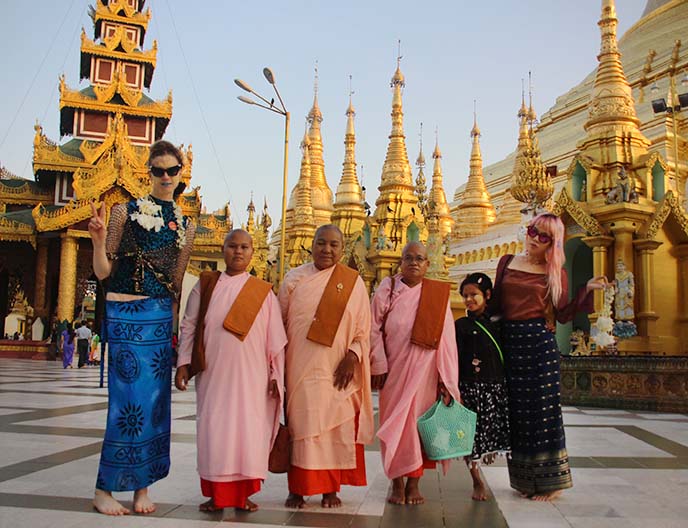
Yukiro and I are standing inside Shwedagon, with lovely locals. This huge golden Buddhist temple complex dominates the Yangon skyline, and is one of the most sacred sites in Myanmar (Burma). The name breaks down to “shwe” (gold in Burmese) and “Dagon” (the township where it is located).
That day, we met the kindest, gentlest Buddhist nuns, dressed in pink robes…
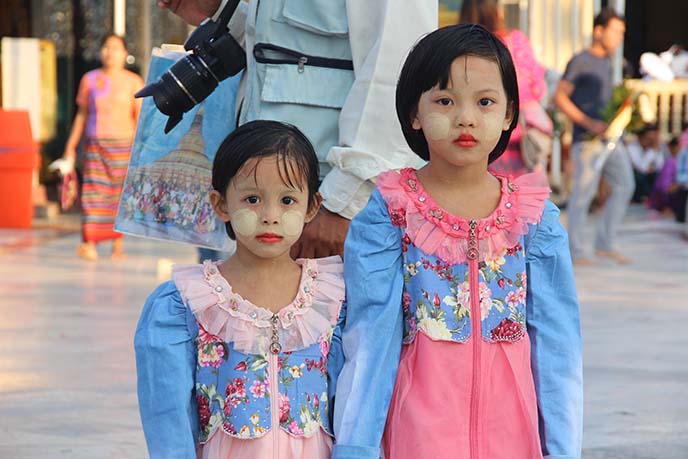
… and children with thanaka (sun-protecting face paint) on their cheeks. (All photography by Sniper Chau.)
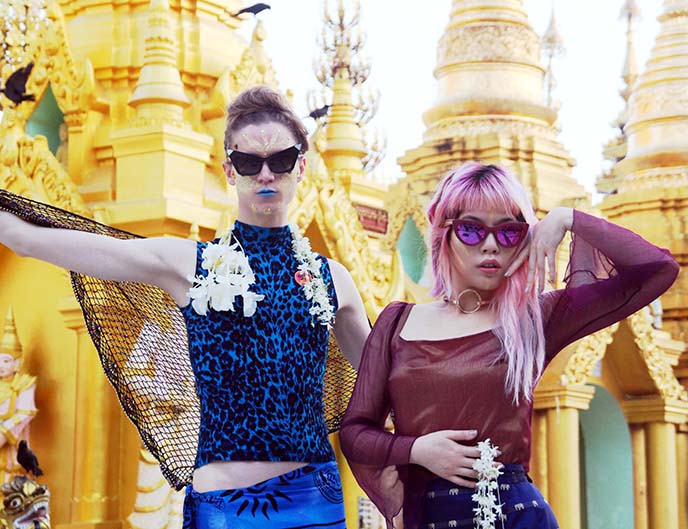
Let’s begin our visit to Shwedagon Pagoda with a note on the dress code. Out of respect to those who come to the temple to worship, all visitors (male and female) should wear clothes that cover their legs and shoulders. Shorts aren’t permitted, but there are longyi that you can borrow at the front if you forget.
Despite the clothing restrictions, you can still glam it up — as we did! We wore long wrap skirts (mine is from Thailand), and lightweight tops that kept us from overheating in the humid weather. (Yukiro had the shawl over his arms except for this moment of posing!) Sunglasses are a must, as the golden glare hits hard once the sun rises. In addition to sunscreen, we painted some thanaka over our skin as well.

We met our ParkRoyal Hotel Yangon driver in the lobby at 6am, as we wanted to catch the dawn. It’s worth waking up early, as sunrise and sunset are the best times to visti Shwedagon Pagoda. (You also avoid the crowds and the high noon-time heat this way).
The temple is open from 4am to 8pm, and the entrance fee for foreigners is $8 (about 8000 kyat — make sure you have the local Burmese currency). Everyone must remove his or her shoes at the entrance, and go barefoot inside the complex. If you’re a foreigner, there’s a special rack where you can store your shoes (otherwise, you’d have to carry them with you).
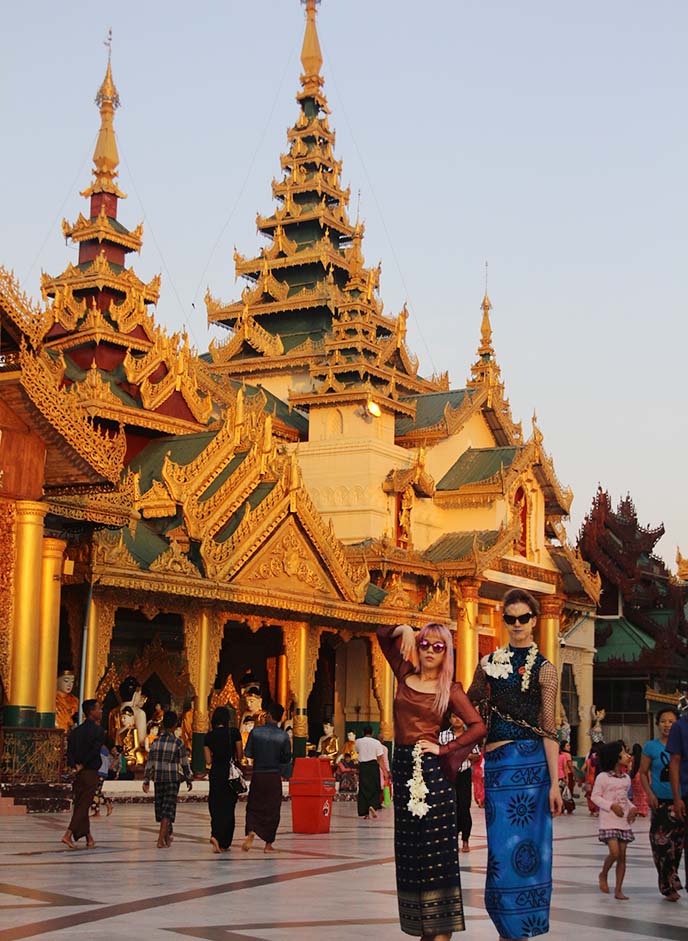
We walked down the long corridor, and bought a fragrant strand of white flowers. It opened up into this mesmerising plaza filled with gilded architecture and colorful Buddhist statues — we felt as if we’d entered a new universe.
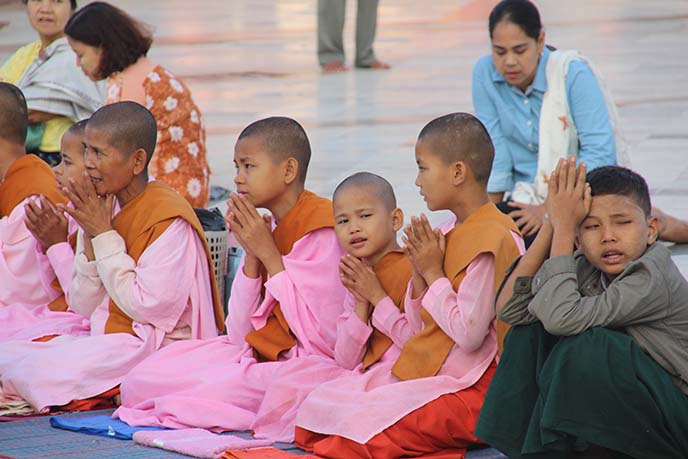
Shwedagon is a feast for the eyes and senses. It’s filled with an energy of compassion and happiness — as personified by these praying, chanting Buddhist children.
The pagoda sits on Singuttara Hill, and holds the relics of four Buddhas. The first version was most likely built by the Mon people between theb Shwedagon Pagoda was pillaged many times, rebuilt and expanded, and struck by earthquakes — but has stood strong, and is grander than ever.
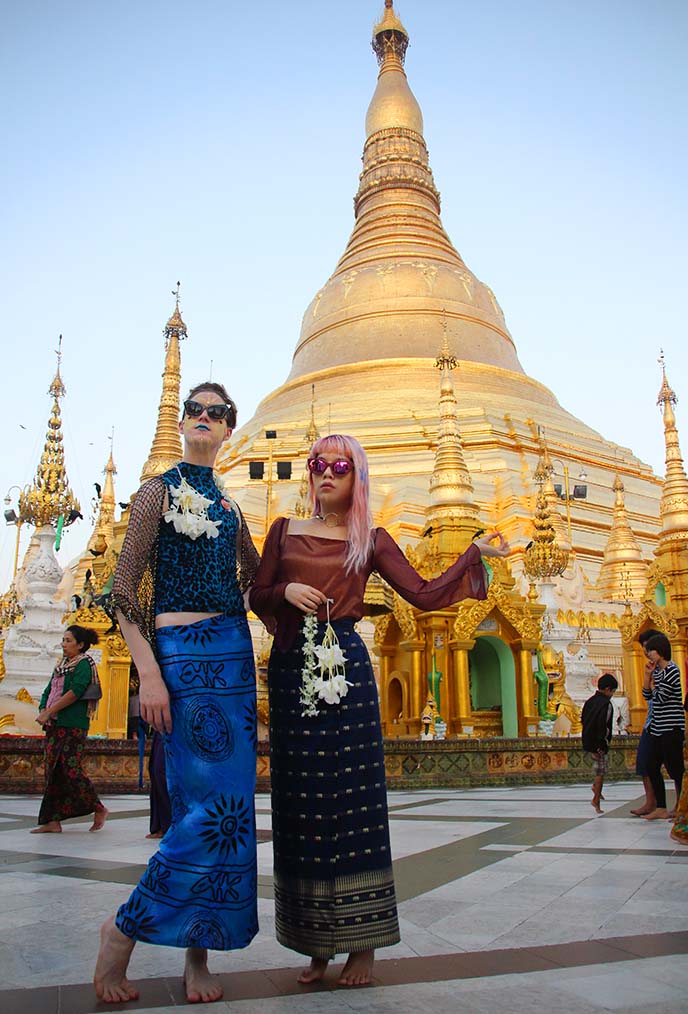
Could there be a destination more fabulous than this one?
Shwedagon is the largest stupa in the country, at 99 meter high. It’s plated with over 20,000 gold bars, with a tip decorated with thousands of diamonds, rubies and sapphires. The various buildings hold treasures of Burmese art, including the Tharrawaddy Min Bell that weighs 44 tons.
(In the 17th century, a Portuguese adventurer stole the 300-ton Great Bell of Dhammazedi — but it fell into the Bago River and was never recovered.)
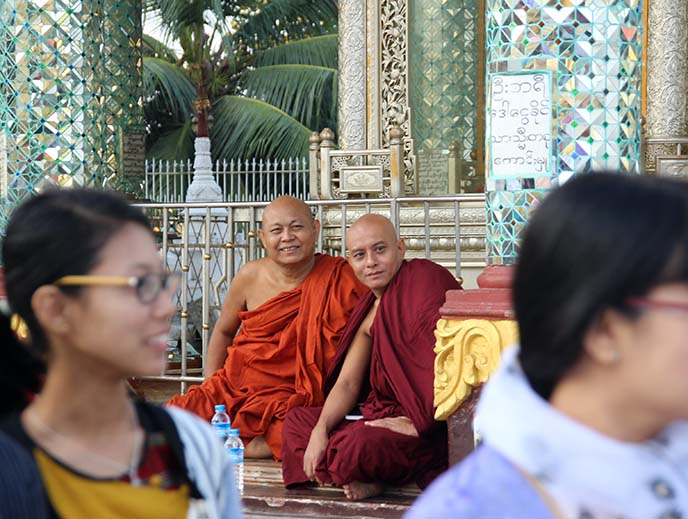
Myanmar is the world’s most Buddhist country, with most locals identifying as Theravada Buddhists. It’s a regular sight to see monks and nuns of all ages in the city, and we encountered many smiling faces here.
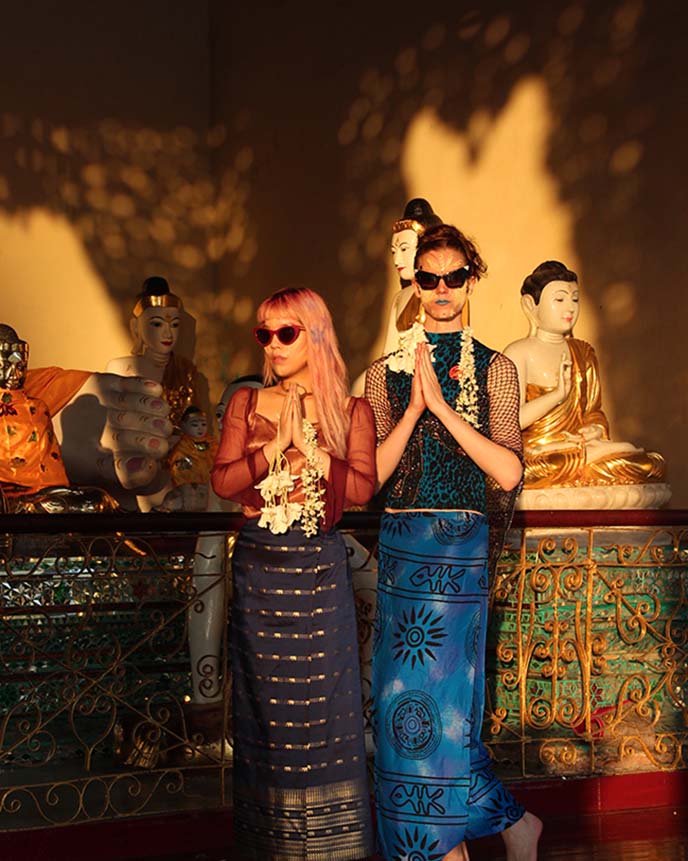
I think Yukiro and I fit in rather well with the decadent, golden art!
Visitors can spend hours wandering into the various buildings, where there are thousands of Buddha statues and relics to behold.
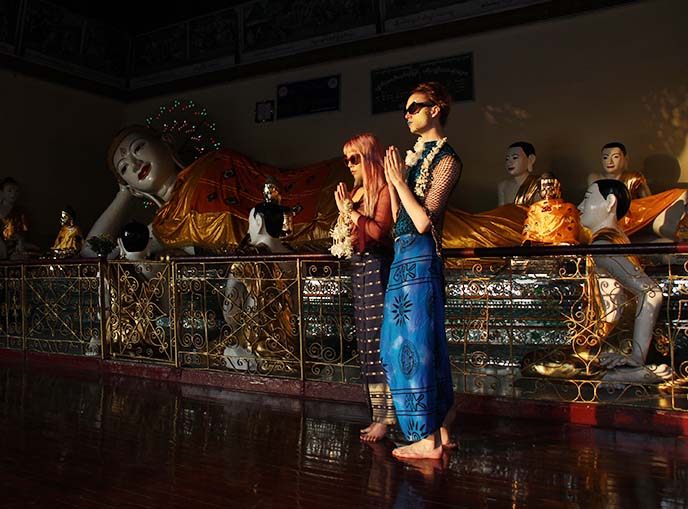
Although Shwedagon Pagoda is centuries-old, and has traditional architecture, you’ll also see modern incarnations. Such as this reclining Buddha with a flashing, electric cyber-disco halo around his head.
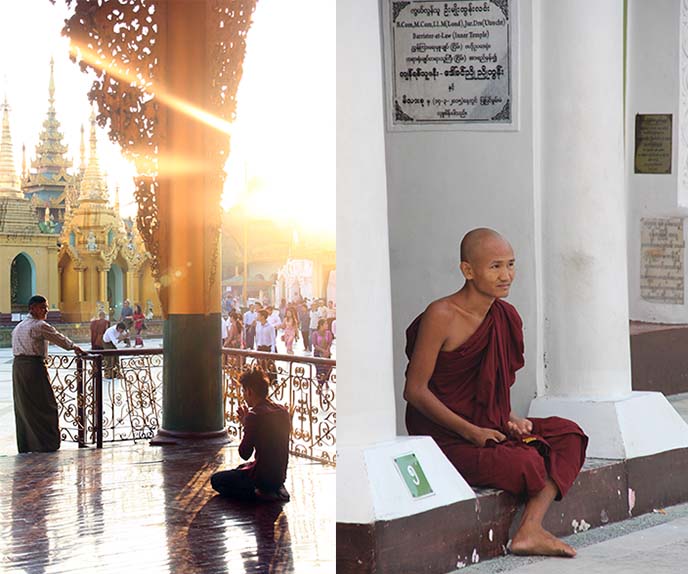
The spirituality is open and welcoming in Myanmar. We saw punk rockers praying, and monks with tattoos. Some locals choose to become monks or nuns for a short period of time (such as few weeks or months).
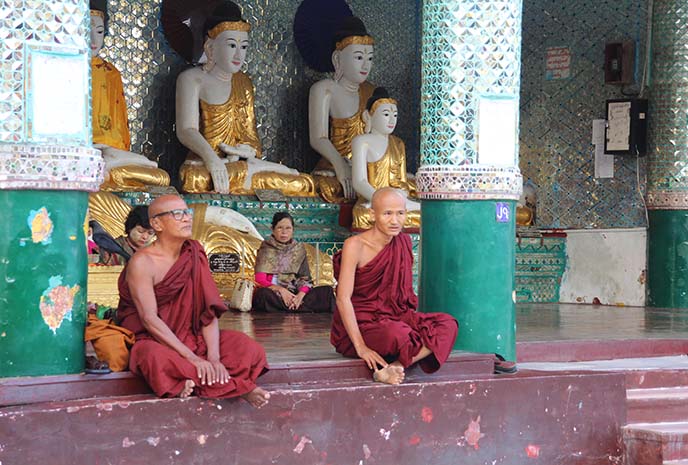
I wasn’t too familiar with Burmese sculpture / art until I visited, and was in awe. In this tradition, Buddhas are smiling and friendly, and draped in golden robes.
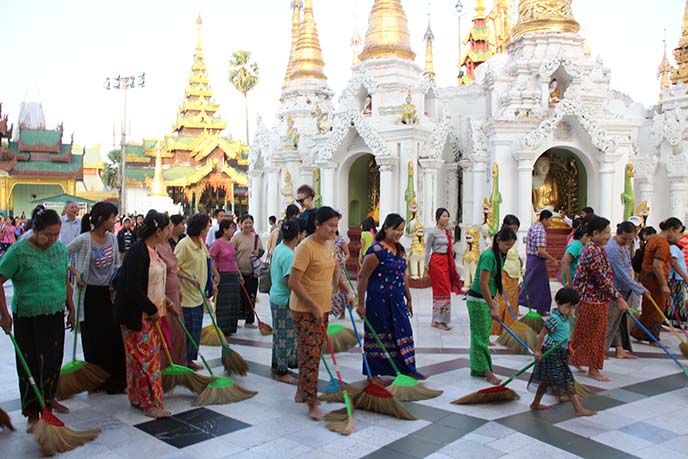
We had no issues walking around barefoot, as the tiles are kept clean by volunteers with mops. Locals have always pitched in to preserve Shwedagon, taking part in activities such as sweeping the floor, washing the statues, and repairing damaged areas.
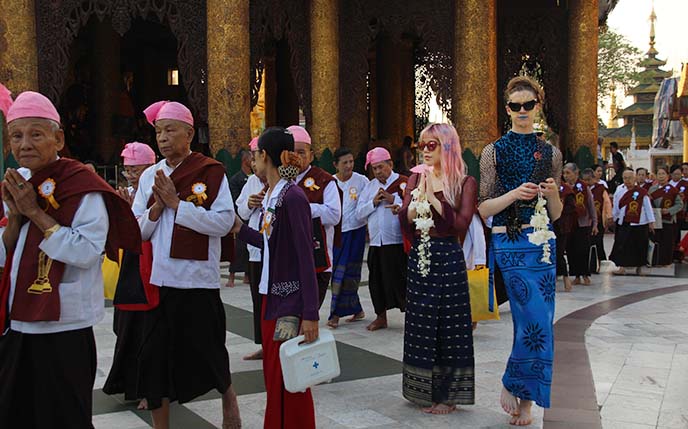
The stupa is a top Buddhist tourism destination. We saw a tour group of men and women in pink headwraps, travelling together on a spiritual pilgrimage.
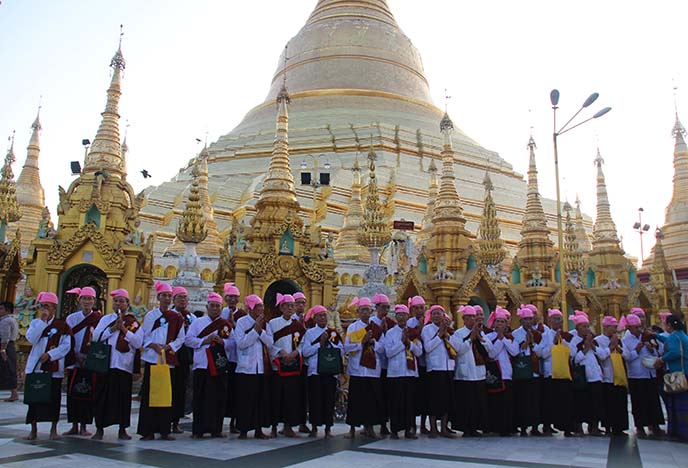
I loved seeing the joy and tranquillity on everyone’s faces.
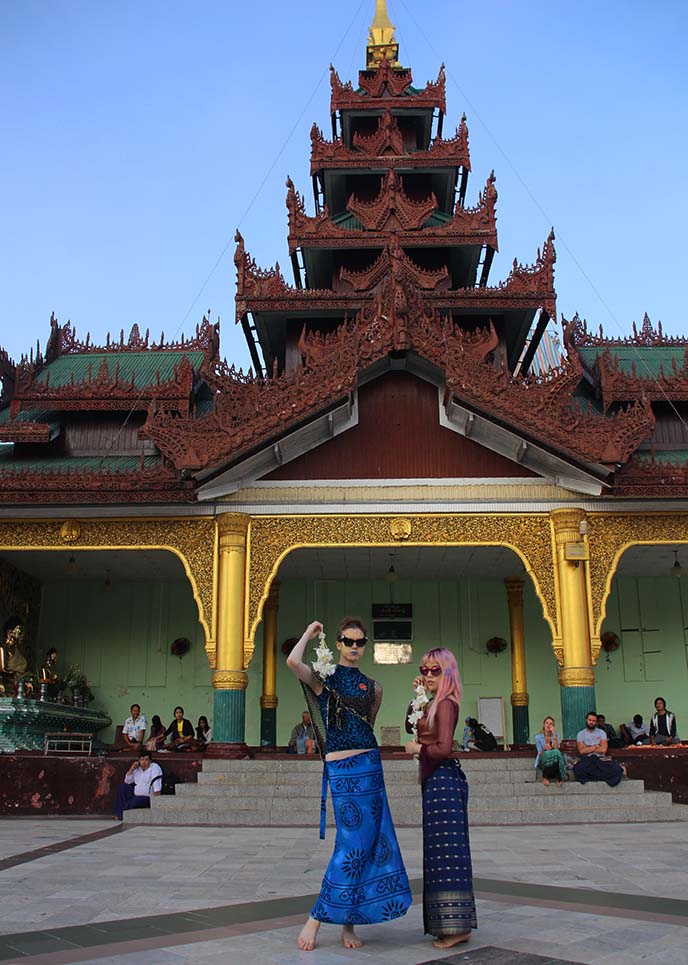
Burmese architecture ranges in styles. This reddish-brown spiky roof spoke to our Gothic aesthetics.
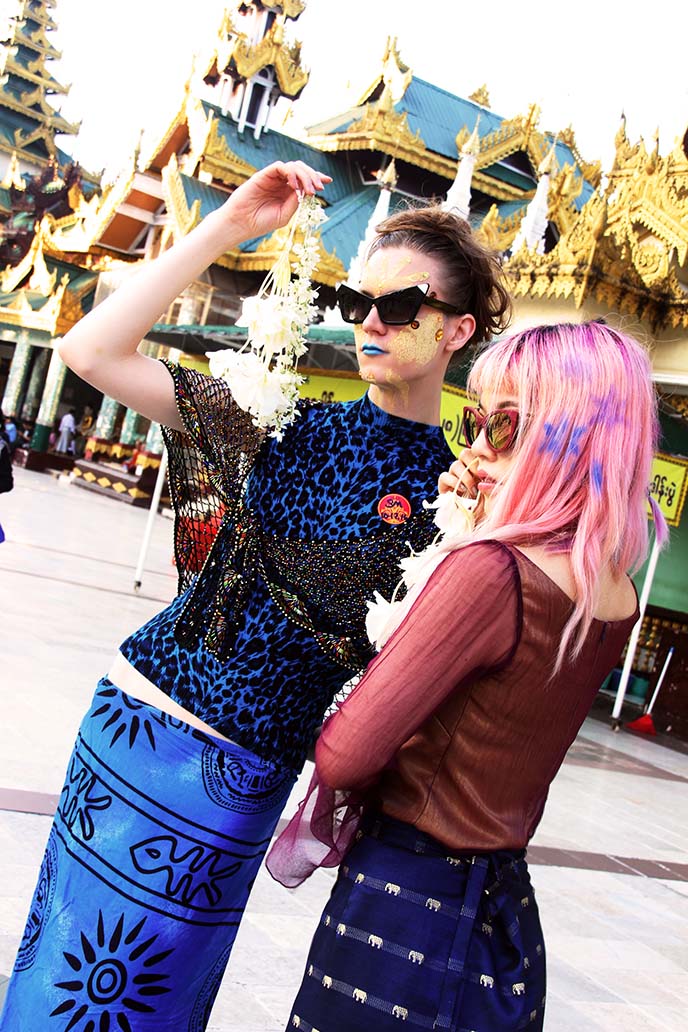
As the sun continues to rise, the tiles heat up. It’s good to go early (as we did) so that you can leave before high noon.
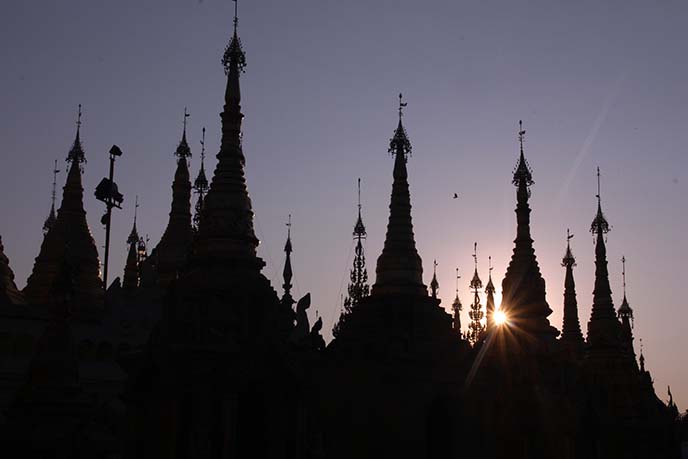
As author Rudyard Kipling described it: “Then a golden mystery upheaved itself on the horizon, a beautiful winking wonder that blazed in the sun.”
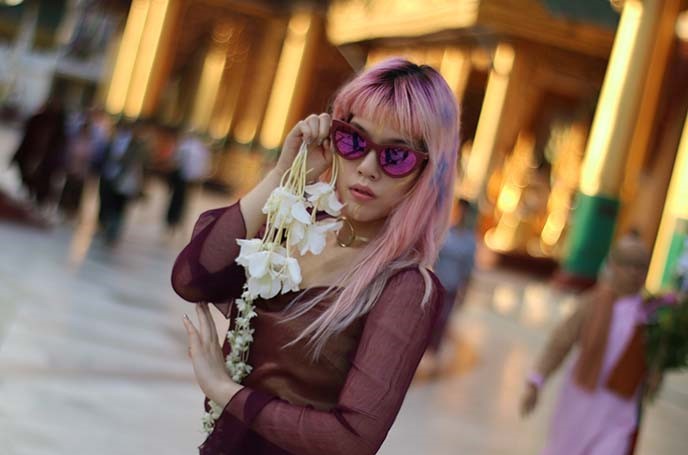
Wearing cat-eye sunglasses by Moat House Eyewear, which match my pink hair and top.

A lot of locals came up to us, and gently asked to take photos together. We got nothing but compliments on our outfits and style.
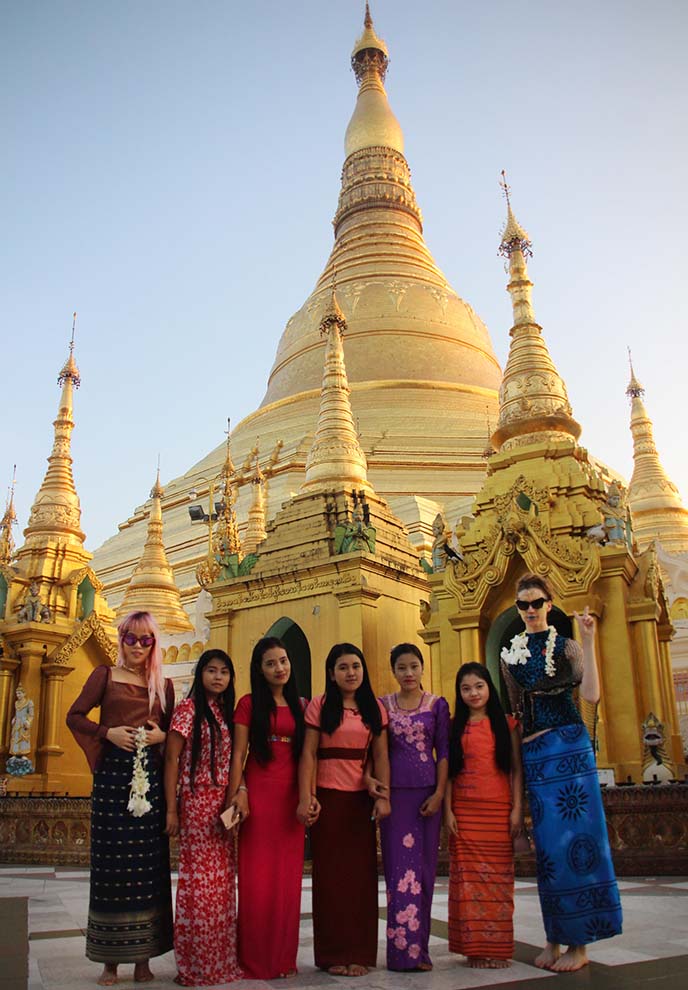
We became fans of the elegant, traditional fashion — particularly these Burmese long skirts, or longyi. This group of women shows it’s possible to be chic while following the dress code.
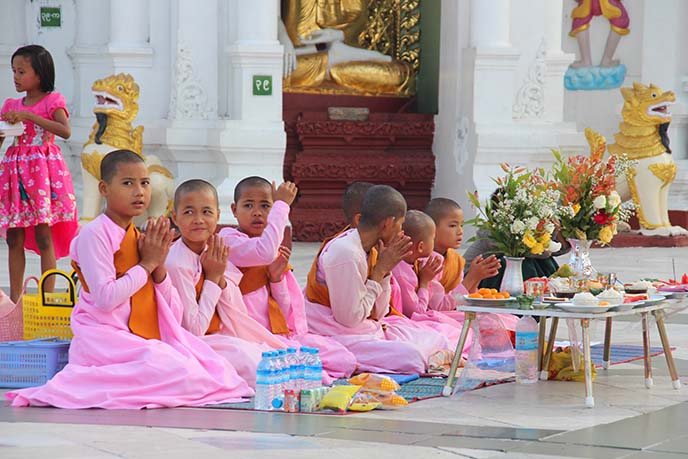
Offerings of fruit and flowers for the Buddha, made by these young devotees.

Loved seeing the small moments of generosity all around Shwedagon Pagoda.
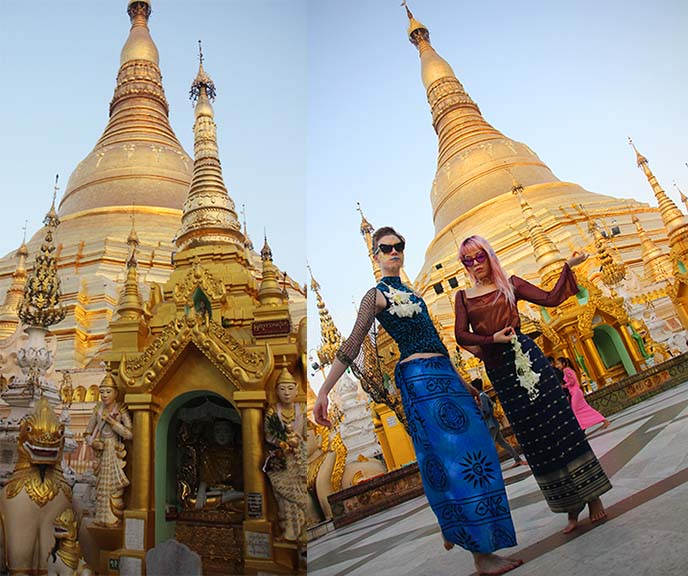
Myanmar has only recently opened to tourists, which means landmarks like these are still very locals-only. We saw only about 10 foreigners during this visit, and there weren’t any gift shops or touts.
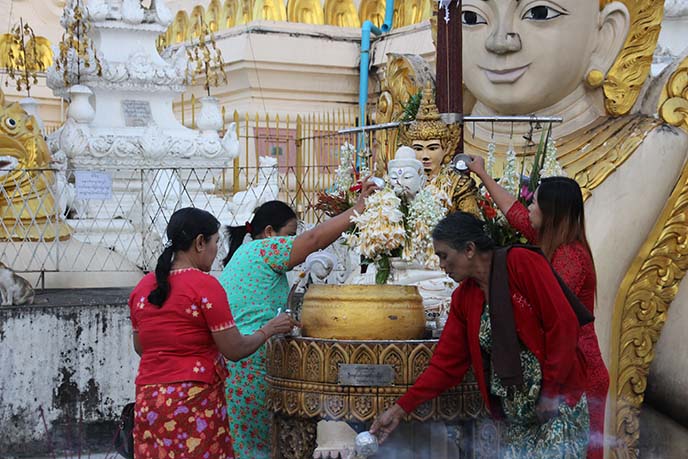
Many Burmese also follow traditions that come from Hindu astrology. They pour water and perform purifications at their “planetary post,” which refers to the day of the week they are born on. For example, if you were born on “Wednesday Morning,” you would look for a basin with this signpost, and make offerings and wishes there.
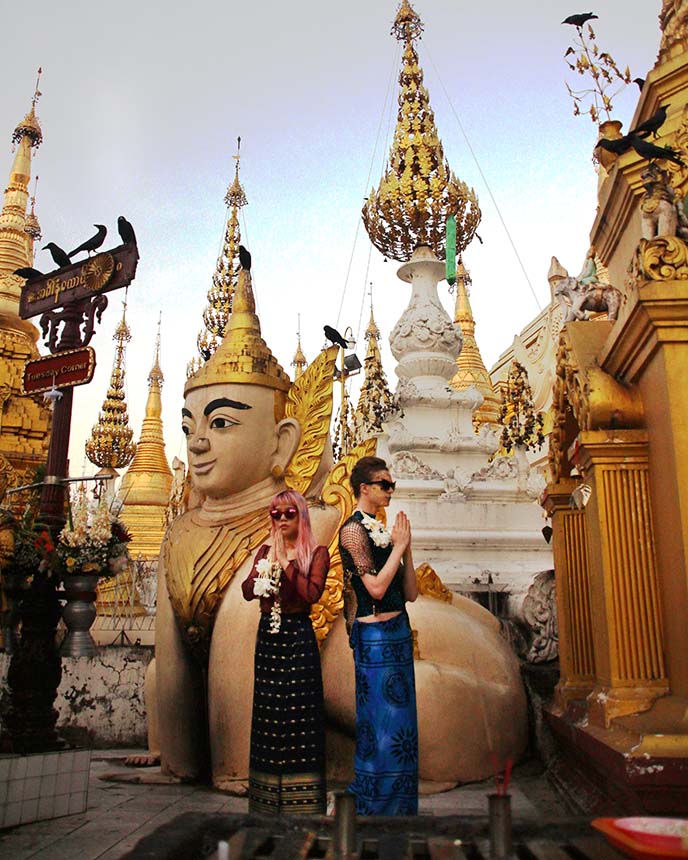
On the left, you can see the sign for “Tuesday Corner.”
We didn’t know which day of the week our birthdays fell on… but the giant leogryph (mythical lion creature) looked like our spirit animal.
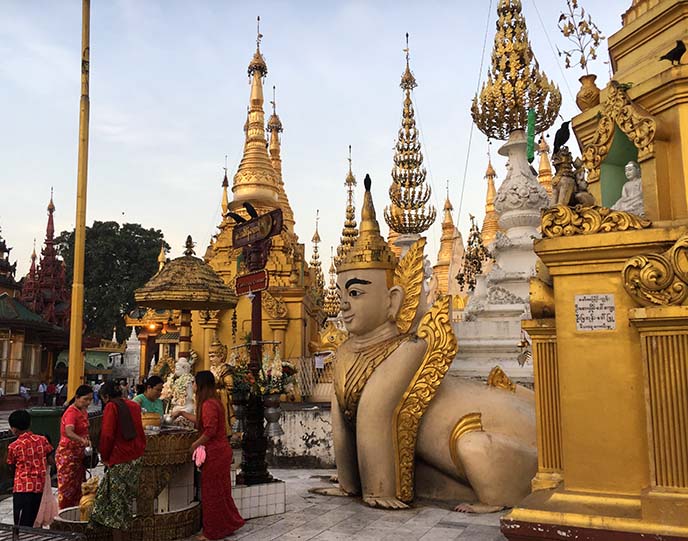
This protector lion being is a “chinthe”, often found at the entrances of pagodas and temples in Burma, Cambodia and Laos. Love the sideways-facing paws.

Snakes are another guardian, depicted with vampire-like fangs. The precise carvings found all over Shwedagon are impressive.
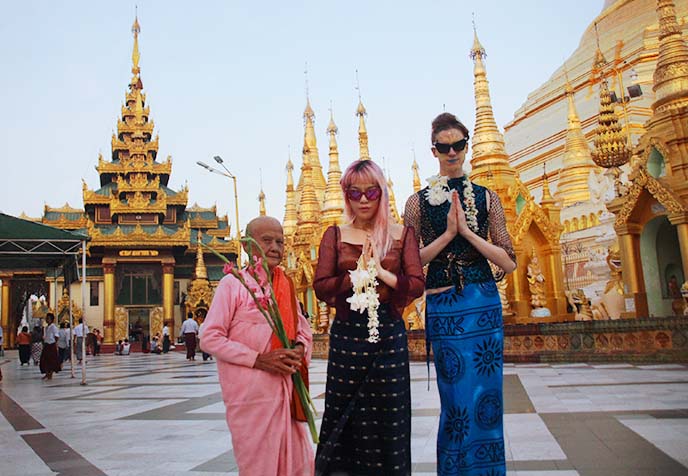
Photography is allowed in Shwedagon Pagoda. Anyone can respectfully ask monks or nuns if they’re willing to take a photo. However, as our guidebook counselled, one must not touch their robes (not even for a friendly pose).
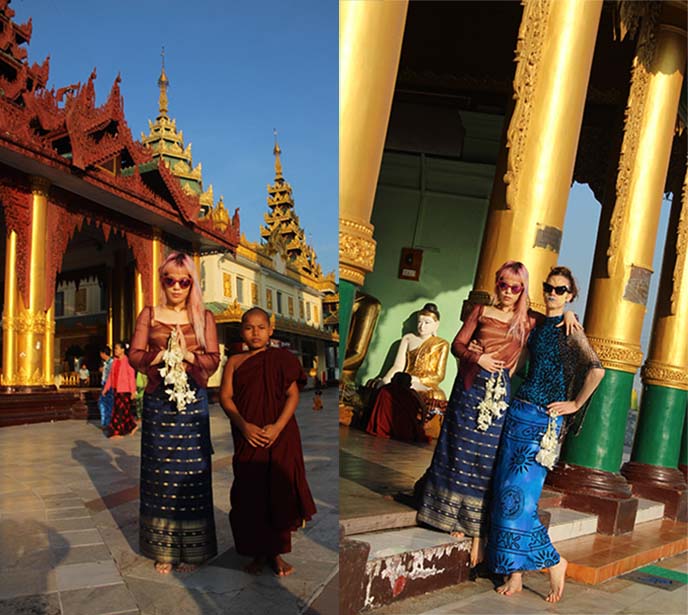
As you can see — it’s ok to stand next to a monk after getting his consent to take a photo together. But langorous arm-draping is a no-no!

Burmese children grow up learning the founding legend of this stupa. Once upon a time, two brothers were traveling when they met the Buddha beneath a tree. They offered him food, and as a thanks, the Buddha gave them eight hairs from his head!
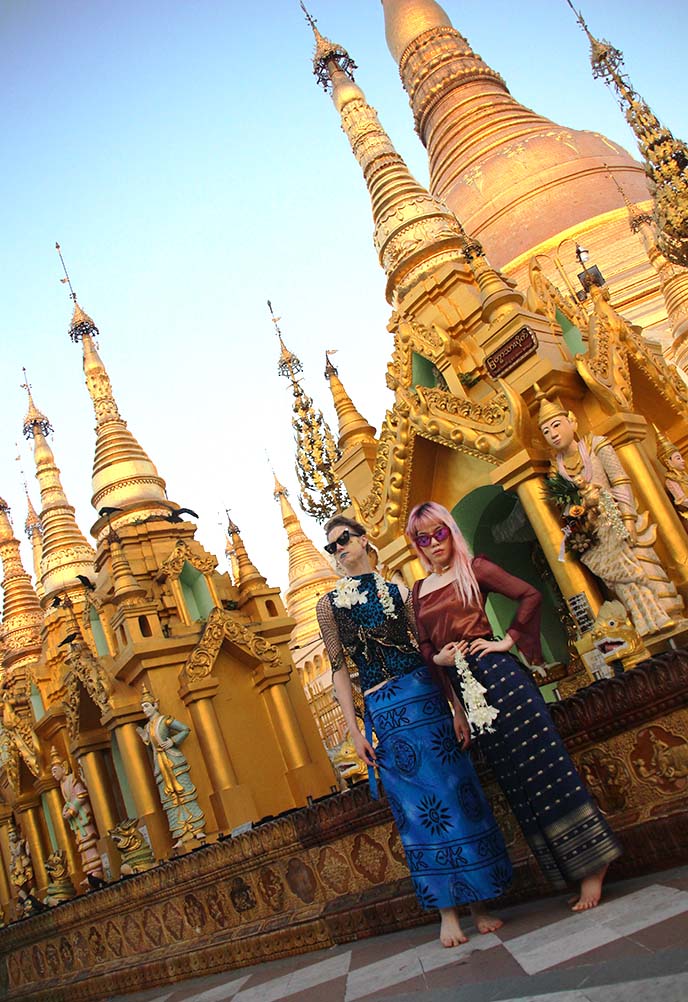
The brothers put the 8 hairs in a ruby casket and carried them back to Burma, where they started to build Shwedagon Pagoda with the help of their king.
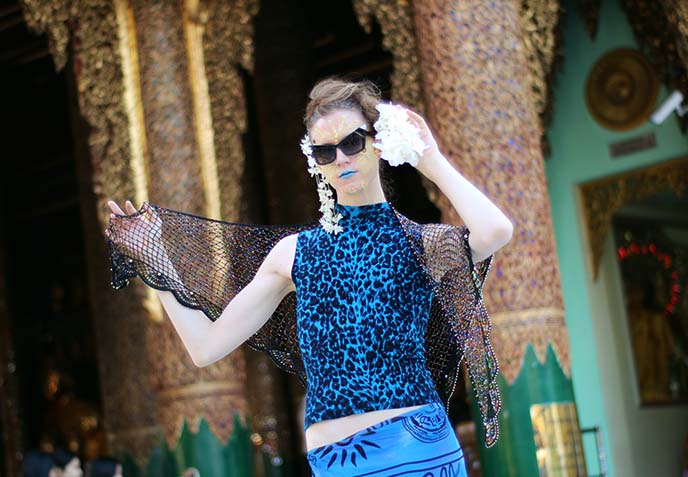
There are other relics preserved in the temple complex, ranging from sacred robes to… an ancient water filter.

This sign illustrates the story of the Buddha’s journey to enlightenment. Love the rainbow colors, and the gorgeous Burmese script.

It’s apparent how much meaning the Buddhist teachings have to locals here, through each stage of their lives.
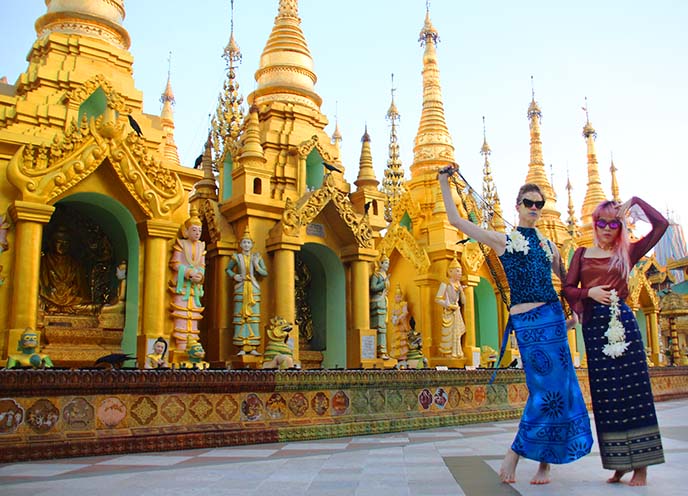
We’re very glad we got to spend time in Myanmar, a travel destination that people often overlook.

Such an interesting contrast between monastic simplicity, and golden richness.
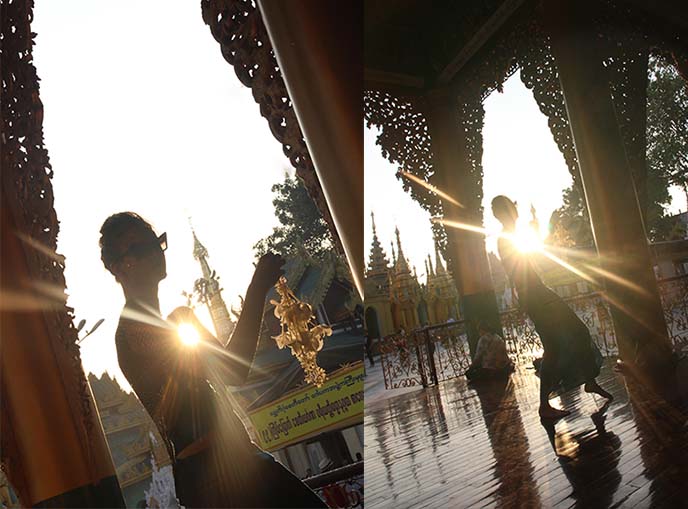
When we saw these flares of light, we knew why “Shwedagon Zedi Daw” is also know as the Golden Pagoda.

Don’t forget to walk around the edges of the complex, which tend to be quieter, and filled with surprses. Such as: a bodhi tree.

Siddartha Gautama meditated under a bodhi tree until he attained nirvana. Perhaps this monk, crouched under the canopy, will follow his path.

We encountered this lion guardian on the outskirts as well. The pale pink claws are on point.

Shwedagon is heaven for people-watching and photography. (All images by Sniper Chau.)

The women we met were stylish and self-possessed. The Burmese are known for their welcoming nature, perhaps testament to the Buddhist culture.

This nun smiled at us as we passed by, and her group of children followed suit. Moments like this remind me of why I travel.

I hope this photo diary conveyed the magic of Yangon’s Great Dagon stupa. Although the pagoda is not a household name, it now ranks among my favorite wonders of the world (and I’ve been to Petra, Angkor Wat, Hagia Sophia and more).

Coming up: we’ll show you more of Yangon, including Sule Pagoda and art galleries. A big thank you to ParkRoyal Hotel for the driver and travel tips. (See our review of ParkRoyal Myanmar here.)
Have you heard of Shwedagon before? Isn’t this spiritual site inspiring? Thank you again to everyone who voted for me in the Best Blogger of the Year awards — none of these adventures would be possible without your love!
SHARE & COMMENT

 LA CARMINA
LA CARMINA







24 Comments
i love ヽ(;▽;)ノ
^^
beautiful myanmar. xo
Such beautiful people.
THANK YOU ❤ for coming.
xoxo
Stunning photography.
Jonny
It was a great day.
Happy Valentine’s Day
You have some awesome style, both of you.
<3
❤❤❤❤❤
xxxx
What a Golden sensation it was to visit!!
A temple that fits our standards!
So fashionable
^_^
An extraordinary destination.
Wow, so sweet!
Thank you for showing me this side of Burma/Myanmar. I hope more people get to visit.
me too!
Well written blog…Congragulations on winning the best blogger award …The way you write there are many more to go…Loved the
temple structures...
Thank you La Carmina and Yukiro! Myanmar is such a very promising tourist destination especially to those who love history. I for one is interested to visit the country. Did the gov’t make it easy for you to stay in their country? Are there local tour guide who can speak in English? How expensive is the accommodation compared to Thailand or Vietnam?
Hi Gie! Myanmar is such a lovely destination. You just pay a visa on arrival (depending on your passport), but it was easy to get in, and there are plenty of inexpensive accommodations. Prices are lower than the tourist parts of Thailand, and perhaps about the same as Vietnam. You can def get by on a small budget each day! No need for a tour guide, most people explore the temples and sights on their own. You can see more in our Myanmar blog category. Hope it’s helpful! https://lacarmina.com/category/myanmar/